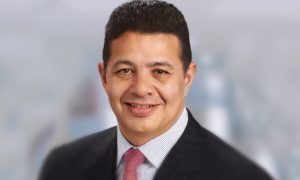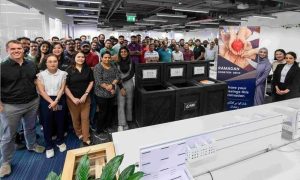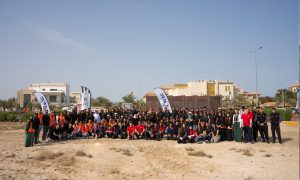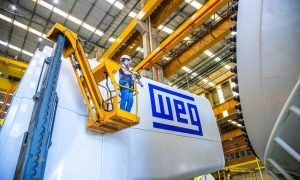Interview: David Richter, CEO of Hill International
An in-depth chat with Richter six months after he took over from his father
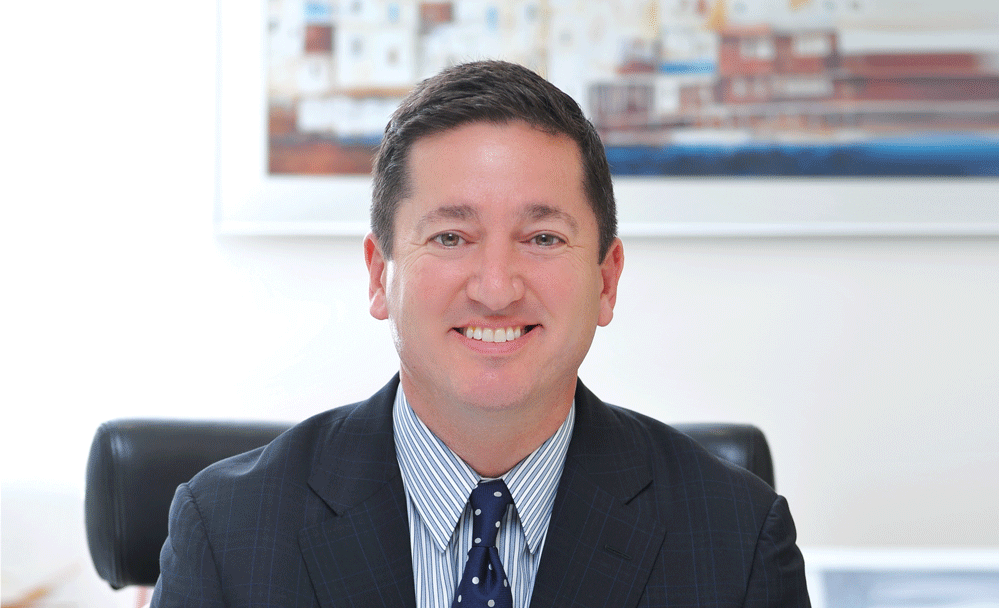
Back in 2003, during a speech to new graduates at the University of Texas, Michael Dell, founder of Dell Computers, first said what was to become one of his most famous and repeated quotes. He told the crowd of young listeners that one of the keys to success was to: “Never be the smartest person in the room. And if you are, I suggest you invite smarter people… or find a different room.”
It’s tempting to wonder if David Richter, the CEO of Hill International, has listened to this speech. In an interview with Big Project ME at Hill International’s Dubai offices, he has very similar sentiments when he outlines his philosophy for business.
“You see a lot of companies in this industry where the founder’s name is on the door, and he’s the smartest guy in the room. It’s all about him and he’ll have a lot of underlings surrounding him, or her. The lesson [we’ve learnt] at Hill is that you have to go and find the best and the brightest and bring them into the company. I’m a civil engineer and I’m working on a Master’s degree in Project Management at the moment, but I can tell you, you don’t want me managing a construction project! I consider myself an expert manager, but not a construction expert,” Richter says.
“So you know, when I go into a meeting, I want the smartest guy I can find to be in the meeting with me, so as to represent the client’s best interests. And we have a company that’s filled with people like that, and that process can never stop.”
That philosophy was handed down to Richter from his father, Irvin Richter, the founder and former CEO of Hill International. “I would say that was the most important lesson I’ve learnt from my father, it’s a lesson that he learnt very early on. I think it was primarily driven by the fact that he was not a technical expert in construction, and that’s no disrespect to him. He really built the company up because he was the best salesman and public speaker in the industry, but he was forced to surround himself with the best people in construction.”
Having taken over as CEO of Hill International from his father at the start of 2015, Richter is mindful of the responsibilities that entails. Although he has been involved in the company for nearly 20 years, 10 of them as chief operating officer, he says that stepping into his father’s shoes has been a chance for him to put his own stamp on the company and its mission.
“A big part of my father’s strategy was growth. It was a mutual strategy, we’ve always seen the long-term possibilities for the company. That small consulting firm he started at home, he always saw that it had tremendous potential. When I joined, we were at about 200 people doing $20 million a year in revenue. This year, we expect to break 5,000 people for the first time, and do about $750 million in revenue. So it’s a very different company and you don’t manage that business in the same way, it has to be a lot more decentralised.”
Despite these ambitions, Richter is keen not to lose sight of what made Hill such a success in the first place – the culture that his father built up, that of a small business, with a sense of family and belonging. He’s keen that the individual offices of Hill International scattered around the world continue to enjoy the freedom they had under his father.
“We operate in a decentralised way. We give our local regional managers a lot of autonomy and authority, and we keep the organisation structure as flat as possible so that there aren’t a lot of levels of communication between the head of the Dubai office, for example, and myself. Decisions can be made very quickly, they don’t get made by a committee.
“In fact, we do everything we can not to have our company run by committee, because a) it causes the wrong decisions to be taken, and b) it takes a much longer time. We believe that the speed of the process is paramount, and that means single points of responsibility and as little bureaucracy and governing by committee as possible,” Richter states.
This approach is clearly paying off handsomely for Hill International. In May this year, the project management and construction risk management specialists announced first quarter results for the year ending March 31, 2015. Total revenue for Q1 2015 was a record for the company, with $171.6 million posted, an increase of 14.4% on the same period in 2014.
Consulting fee revenue alone was $152.5 million, an 11.1% increase from last year. Operating profit for Q1 2015 stayed unchanged from last year at $6.0 million, but net earnings were up 1,966%, to $1.1 million, or $0.02 per diluted share, from net earnings of $0.1 million, or $0.00 per diluted share in Q1 2014.
The company’s total backlog stood at $1.039 billion, compared to the $1.080 billion registered on December 31, 2014. The 12-month backlog on March 31, 2015 was $445 million, compared to $470 million at the end of 2014.
The Middle East contributes up to half of the company’s revenue, while approximately 20% of revenue is generated from US operations.
These are highly positive figures, but Richter insists that he sees room for improvement and evolution within the company, despite having “hit the ground running” since he took over at the turn of the year.
“I was very happy with how we did in the first quarter, but we definitely need to do even better. That’s not because we’re a public company that has shareholders that want improved quarterly performances, but it’s for our own internal purposes.
“We have a company that has been, by any and all measures, one of the most successful in the industry, worldwide. But if you look at our stock chart you wouldn’t think that, because the stock hasn’t performed as well [as it should have],” he states frankly.
Given that the company only went public in 2006, it has had to deal with a lot of external turmoil that was out of its control. Not only did the global financial recession have a major impact, but a bold move into the untapped market of Libya caused serious repercussions and an over-leveraged balance sheet, thanks to the revolution and ongoing civil war there. However, Richter points to the Q1 financial results to show where the company is now headed.
“We’re in a position this year where we’ll see our third consecutive year of double-digit revenue growth. We need to make sure that our bottom line reflects that success. While we’ve had a good first quarter, we want to have a great 2015, and so we’ve gone through an effort to right-size our overheads. I think that if we can do that to the level we’re projecting, then we’ll have a record year and the stocks will react accordingly.”
Despite the issues Hill faced in Libya, Richter says he hasn’t been dissuaded about expanding his company’s reach into countries that may be considered more trouble than they’re worth. With the Middle East contributing significantly to overall revenue, he’s determined to follow through on plans, even if it means adjusting and adapting to changing circumstances in the region.
“We’ve wanted to be a global company and we’ve pushed very hard to be so,” he explains. “That’s going to put us, sometimes, in markets and countries that are undergoing certain problems. Whether it’s revolutions like we saw in Egypt, Syria and Libya, or the situation in Iraq. Fortunately, in Egypt things got back to normal rather quickly. In Libya, they didn’t.
“Certainly, we’ve had some challenges in Iraq this year, but the way we deal with that is by going back to the very first part of the strategy, which is being global. You can’t be too reliant on any one country for your revenues. Even when Libya went to civil war and we had to shut down our entire operation there, we still grew that year, we still saw revenue growth. So that means that the diversification strategy that comes with being a global company has really paid off,” he asserts.
One benefit of this expansion strategy is that it comes with very little fixed cost, the CEO says. The company’s primary costs are payroll and rent, which allows easy upscale in markets that are performing well, and easy downsizing when things go wrong.
As befits a global company, the Middle East isn’t the only area of focus for Hill International. The company recently bought one of the largest project management firms in Turkey, growing their business from 30 people on the ground to 130. The buyout of IMS comes as part of a well thought-out move into Turkey and its neighbouring countries, Richter explains, adding that the country is central to Hill’s plans for Africa, Europe and the wider Middle East.
“We see Turkey as being a really strong market for us in the long term. Not just because the internal Turkish economy is growing, but because Turkey is so central to the markets that we’re in – the Middle East, North and Central Africa, Europe and especially the former Soviet Union republics – Kazakhstan, Azerbaijan and places like that. That’s where we see not a lot of competition and a lot of opportunity.”
Interestingly, especially for an American firm, Hill is looking at two other countries with considerable interest.
“We’ve already had internal conversations about both Iran and Cuba being markets that are going to open up. We’re ideally positioned to enter into both markets. Our early success in Libya is a good indicator of what happens once a country opens up to US companies who want to do business there. We can move in very quickly there to establish our name, build a local team and start to win work quickly.
“I think that will be true in Iran, if it’s the next country to open up, or Cuba, or anywhere else.”
For now, however, the focus remains on the Middle East, and on the GCC in particular. Having been in the region for more than 30 years, Hill is established and well-regarded by the local industry. However, the bulk of its business still comes from four countries – Saudi Arabia, the UAE, Qatar and Oman. The next task, Richter says, is to expand and grow into the rest of the GCC.
“Growth is part of our corporate culture, and we’re in the Middle East in a big way. We still see that the biggest growth opportunities for our company are in this region. It’s nearly half our business today, but we see even more opportunities ahead.”
Despite this, Richter says that he doesn’t believe mergers and acquisitions are the way forward for Hill in the Middle East. Having had such success under its own steam and through organic growth, he sees no reason for that not to continue, highlighting the strength and quality of the regional managers.
“We’ve actually never done an acquisition in the Middle East. All our growth here, ever since we opened our first office in Abu Dhabi in 1985, has been organic. We’ve typically seen so much growth here that we’ve tried to acquire elsewhere to balance out the over-concentration over here.
“In spite of that, it’s still the largest revenue generator for the company, and over the years we’ve bought companies in Brazil, Scotland, South Africa, Australia and other places to try and balance it out.”
While reluctant to go into specifics, Richter does say that there will be a continuous drive to hire people who bring a high level of skills to the company, a consequence of the “organic” growth that he anticipates will continue in the GCC.
“I often have to explain to our stockholders and potential investors on Wall Street, who view the Middle East as a fairly risky, politically unstable part of the world, that where we do business, it’s not. It’s logical and it makes sense. Where there’s construction happening, you’re not going to be in the middle of a war zone! It’s typically places where investments are flowing in, capital is flowing in and it’s stable, with opportunities for more development and growth,” he points out.
“There’s no question of that, having watched Dubai rise up for the last 20 years. This is a place that is going to continue to see growth.”



